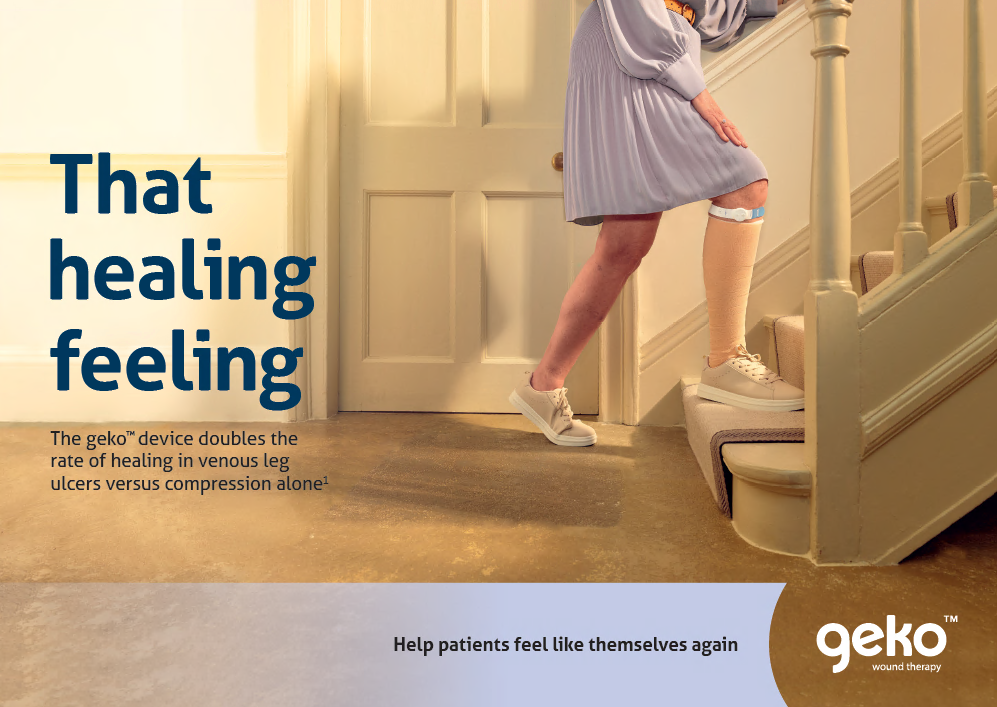The geko device is now reimbursed in the UK.
- Results of a recently published multi-centre randomised self-controlled trial show the geko device, combined with multi-layer compression, doubles the rate of venous leg ulcer healing vs. compression alone1.
- Independent health economic data also demonstrates the geko device is cost saving.
High Wycombe, UK. 20th November – UK-based medical device manufacturer Sky Medical Technology Ltd, parent company of Firstkind Ltd, today announced its wearable geko device is now reimbursed in the UK.
This is an enabler for clinicians to make a recommendation to the relevant approval committee within their local Integrated Care System (ICS) that the device should be considered for local formulary inclusion. In turn, this will help the 5.3 million people in the UK who live with venous leg ulcers (VLUs) access the geko device, bringing new hope for patients with hard-to-heal chronic wounds.
To achieve reimbursement, products must demonstrate safety and quality as well as a positive impact on patient outcomes and the ability to reduce the total costs within the patient pathway. The geko device demonstrated improved clinical outcomes, released significant clinician time and delivered real economic and environmental value to the wound management system.
The size of a small wrist-watch, the geko device is a self-adhesive, wearable neuromuscular electrostimulator that is applied to the surface of the skin just below the knee, over the head of the fibula bone. It delivers a gentle electrical pulse, once per second to the common peroneal nerve, activating the calf and foot muscle pumps, increasing venous, arterial, and microvascular blood flow – effectively replicating the effects of exercise.
Ideal for home use and easy-to-fit, the geko device is a seamless addition to the current VLU pathway, empowering patients to both self-care, without disruption to daily routines, and to share their care with family members and wound care professionals, reinforced by the high concordance rate of 94% reported in a recently published study1.
The study1, a 2023 randomised self-controlled trial, demonstrates geko device efficacy in doubling the rate of VLU healing when used alongside standard of care compared to standard of care alone. Independent health economic modelling also demonstrates the geko device is cost saving.
To establish a clear economic argument, Firstkind commissioned Richard Tuson, Health Analytical Solutions Ltd (HAS) to independently examine the economic outcome of the clinical trial data and the subsequent real-world use of the geko device in this wound population. HAS also led the successful application for UK reimbursement, enabling wound care professionals to now prescribe the geko device, from 1st November 2023.
Commenting – Richard Tuson, Health Analytical Solutions Ltd (HAS)
“Venous leg ulcers are a growing burden, most often caused by compromised venous return. Worldwide, the annual costs for managing and treating VLUs is rising, and in Australia, France, Germany, Italy, Spain, the UK and USA the spend ranges from $0.24 billion (France) to $4.94 billion (US) and totalled US$10.73 billion in the geographies analysed2.
“Patients commonly experience pain and limited mobility, which can lead to depression, anxiety and social isolation, ultimately resulting in a reduced quality of life. Due to the savings related to accelerated rate of healing, the health economic modelling concludes that the cost of the geko device, in combination with standard of care for treating hard-to-heal venous leg ulcers, is lower than standard of care alone.
The geko device optimises wound care professionals time and resources, resulting in significant cost savings for healthcare systems.
Commenting – Bernard Ross, Founder and CEO of Sky Medical Technology
“This is a key milestone for our business and for our global wound franchise specifically. Securing UK reimbursement is a major step towards helping the one in 50 people in the UK suffering with chronic wounds to access a treatment that accelerates the rate of healing, particularly in wounds that struggle to heal with standard of care alone and represent the highest patient cost. It also cements our commitment to the streamlining of wound care through evidence-based clinical and economic efficiency for better patient outcomes and quality of life.”
To find out how to access the geko device, click here.
-ENDS-
References:
- Bull R H, Clements D, Collarte A J, Harding K G. The impact of a new intervention for venous leg ulcers: A within-patient controlled trial. International Wounds Journal, IWJ Wiley: 20 January 2023. DOI: 10.1111/iwj.14107
- Kolluri, Raghu et al. An estimate of the economic burden of venous leg ulcers associated with deep venous disease. Vascular medicine (London, England) vol. 27,1 (2022): 63-72. DOI:10.1177/1358863X211028298
- Tucker A, Maass A, Bain D, Chen LH, Azzam M, Dawson H, et al. Augmentation of venous, arterial and microvascular blood supply in the leg by isometric neuromuscular stimulation via the peroneal nerve. The International Journal of Angiology: official publication of the International College of Angiology, Inc. 2010 Spring; 19(1): e31-7.

